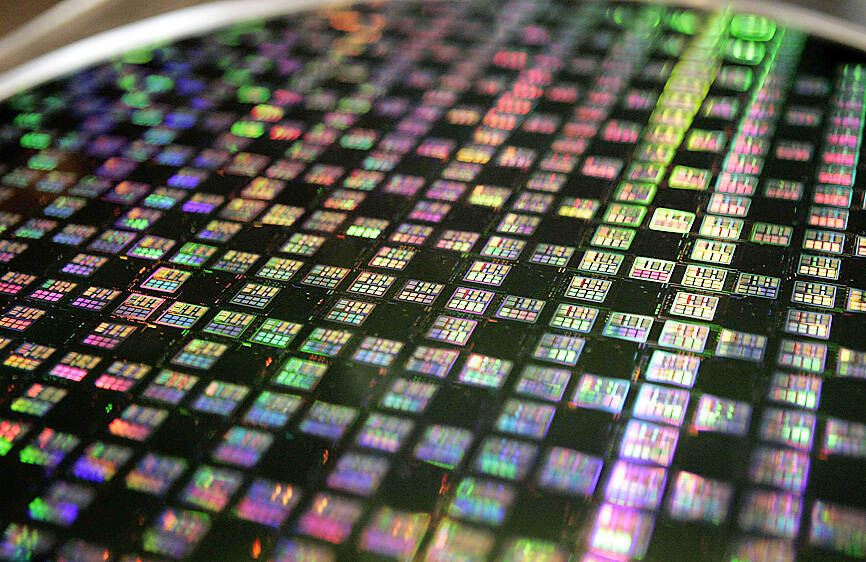It would not be easy for the US to rapidly implement a tariff on imported semiconductors because the cost of the policy to the country would be too high, according to Aaron Friedberg, a politics and international affairs professor at Princeton University.
In response to Taiwanese media’s queries, Friedberg said while US President Donald Trump wants to use tariffs to persuade companies to manufacture in the US, he did not expect the threats to be carried out quickly.
“Given that it will likely take many years to increase US semiconductor manufacturing capacity, the imposition of high tariffs would drive up the costs and reduce the competitiveness of other American industries,” Friedberg said on Wednesday. “For that reason, I would not expect to see these threats carried out all at once or quickly.”

Photo: Richard Chung, Reuters
Trump’s chip tariff threats aimed to push domestic and foreign manufacturers to boost US investments, he said.
“Whether by the threat of tariffs or perhaps more positive inducements and incentives, the US will definitely be trying to encourage Taiwanese and other foreign companies to invest more in the US,” he said.
On Tuesday last week, Trump said he would like to impose a 25 percent tariff on semiconductors, cars and pharmaceuticals, with an official announcement expected as soon as April.
“It’ll be 25 percent and higher, and it’ll go very substantially higher over the course of a year,” Trump said at his Mar-a-Lago residence.
Trump has repeatedly alleged Taiwan “stole our chip business.”
Taiwan Semiconductor Manufacturing Co (TSMC), the world’s largest contract chipmaker, was a self-made success, National Security Council Secretary-General Joseph Wu (吳釗燮) said on Friday.
TSMC is investing US$65 billion in Arizona to build three advanced fabs. In the face of Trump’s tariff threats, it is widely thought that TSMC would establish more sophisticated integrated circuit (IC) assembly plants in the US or even acquire a stake in Intel Corp’s fab operations through technology transfer.
TechSpot, a US-based tech Web site, reported on Thursday that the US and many Western countries are not as efficient as Taiwan when it comes to building semiconductor fabs, saying that “building semiconductor plants in the US takes twice as long, costs twice as much as in Taiwan.”
The West has to streamline fab construction processes to catch up with the semiconductor ecosystems in Taiwan and other Asian manufacturing hubs, it added.
TechSpot highlighted the challenges TSMC has faced in the US, saying that “TSMC struggled to find skilled workers locally, a problem rarely encountered in Taiwan.”
“Cultural differences between TSMC’s Taiwanese management and American employees created unforeseen obstacles,” it said, but that “perhaps most critically, navigating local regulations proved difficult for the global chip manufacturer.”
On Feb. 13, John Bolton, former national security adviser to Trump, said in a media interview that imposing a tariff on chips from Taiwan would not change the reality that the US is dependent on Taiwan-manufactured chips.
The real issue is that the US cannot develop cutting-edge IC capabilities overnight, he said.

The Ministry of Economic Affairs has fined Taobao NT$1.2 million (US$36,912) for advertisements that exceed its approved business scope, requiring the Chinese e-commerce platform to make corrections in the first half of this year or its license may be revoked. Lawmakers have called for stricter enforcement of Chinese e-commerce platforms and measures to prevent China from laundering its goods through Taiwan in response to US President Donald Trump’s heavy tariffs on China. The Legislative Yuan’s Finance Committee met today to discuss policies to prevent China from dumping goods in Taiwan, inviting government agencies to report. Democratic Progressive Party Legislator Kuo Kuo-wen (郭國文) said

The Ministry of Economic Affairs has fined Taobao NT$1.2 million (US$36,900) for advertisements that exceeded its approved business scope and ordered the Chinese e-commerce platform to make corrections in the first half of this year or its license would be revoked. Lawmakers have called for stricter supervision of Chinese e-commerce platforms and more stringent measures to prevent China from laundering its goods through Taiwan as US President Donald Trump’s administration cracks down on origin laundering. The legislature’s Finance Committee yesterday met to discuss policies to prevent China from dumping goods in Taiwan, inviting government agencies to report on the matter. Democratic Progressive Party

Taiwan and its Pacific ally Tuvalu on Tuesday signed two accords aimed at facilitating bilateral cooperation on labor affairs, according to Taiwan’s Ministry of Foreign Affairs (MOFA). The governments inked two agreements in Taipei, witnessed by Foreign Minister Lin Chia-lung (林佳龍) and visiting Deputy Tuvaluan Prime Minister Panapasi Nelesone, MOFA said in a news release. According to MOFA, the agreements will facilitate cooperation on labor issues and allow the two sides to mutually recognize seafarers’ certificates and related training. Taiwan would also continue to collaborate with Tuvalu across various fields to promote economic prosperity as well as the well-being of their

Sung Chien-liang (宋建樑), who led efforts to recall Democratic Progressive Party (DPP) Legislator Lee Kun-cheng (李坤城), was released on bail of NT$80,000 today amid outcry over his decision to wear a Nazi armband to questioning the night before. Sung arrived at the New Taipei District Prosecutors’ Office for questioning in a recall petition forgery case last night wearing a red armband bearing a swastika, carrying a copy of Adolf Hitler’s Mein Kampf and giving a Nazi salute. Sung left the building at 1:15am without the armband and covering the book with his coat. Lee said today that this is a serious